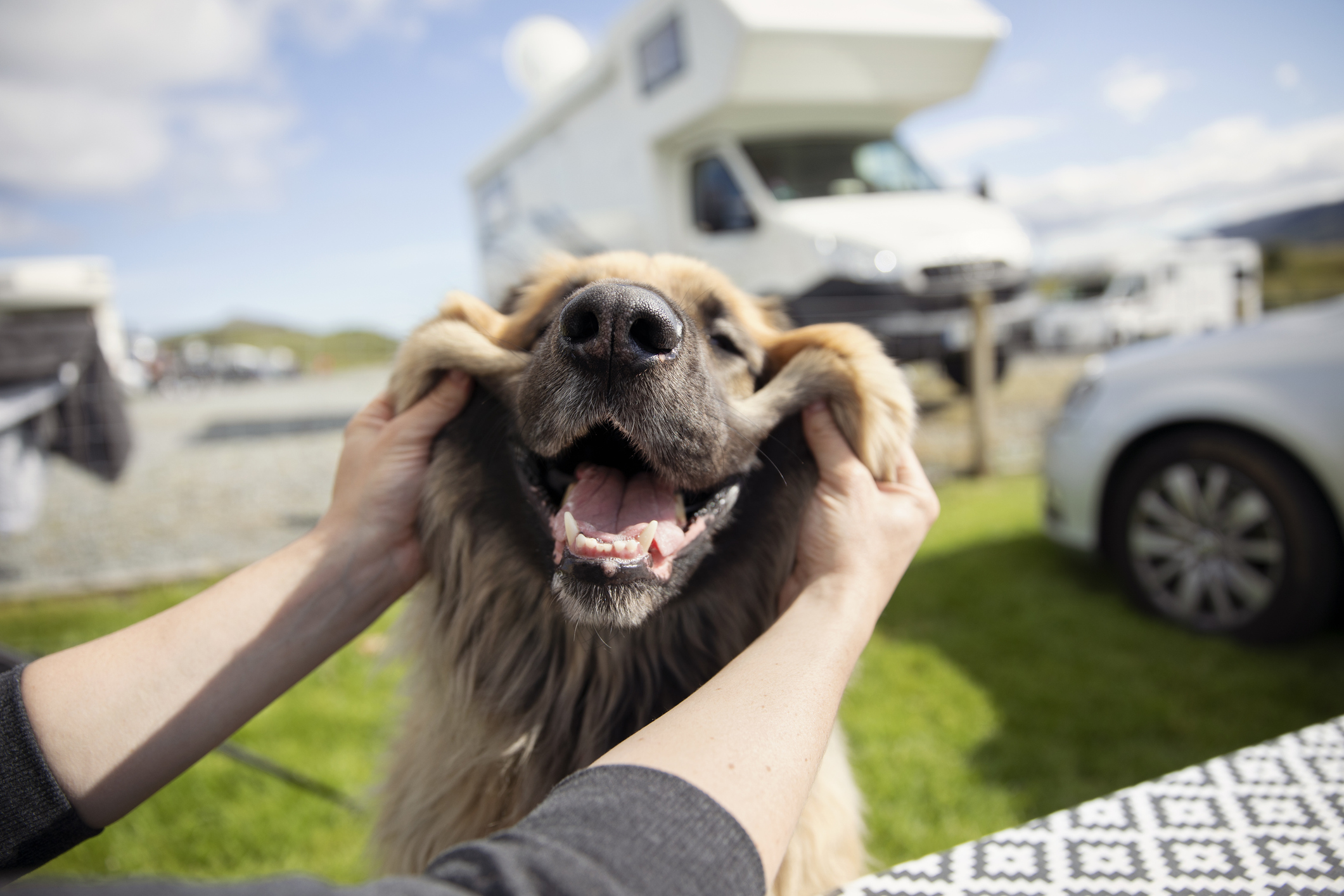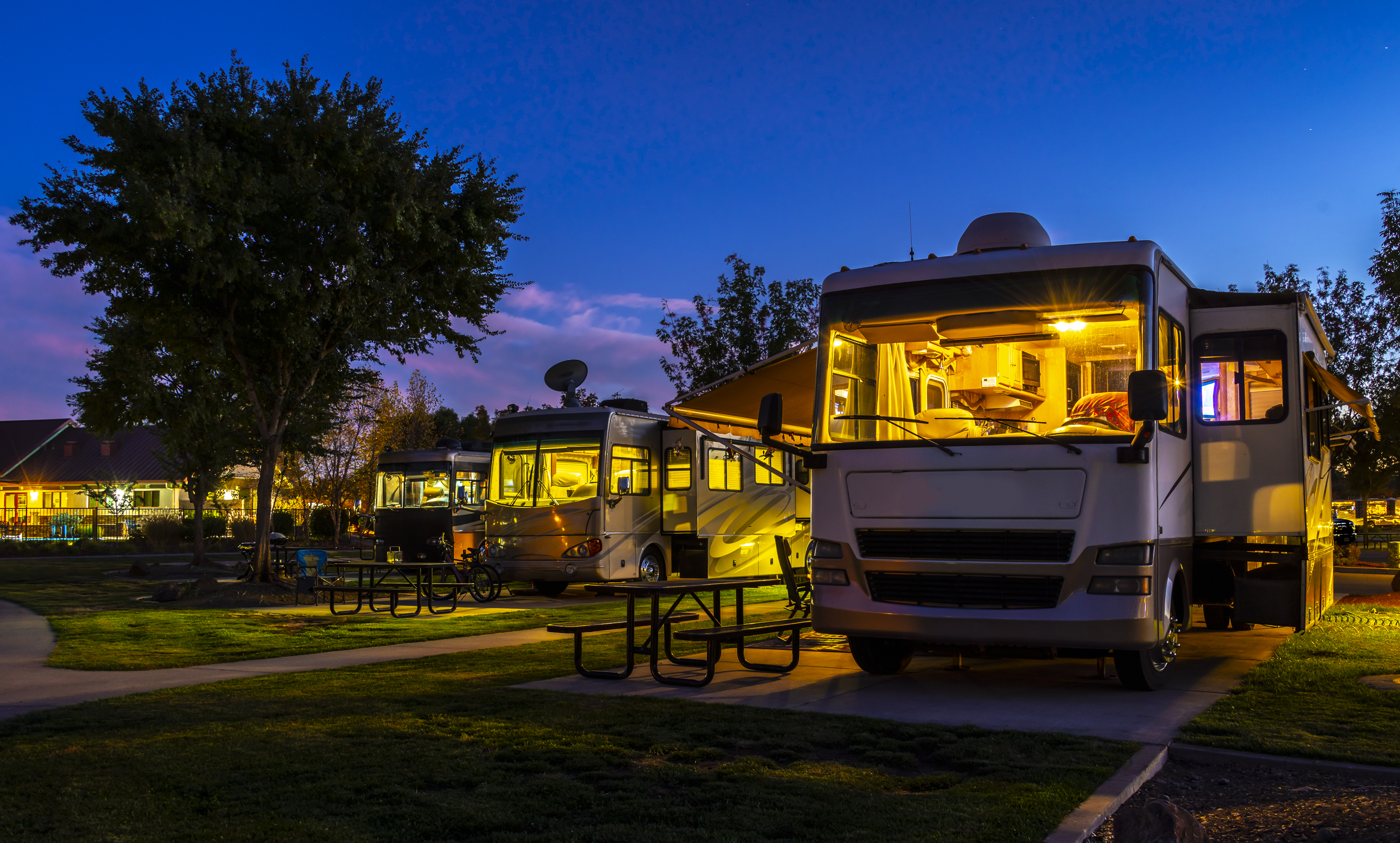Getting into nature is easy, but following good RV camping etiquette takes practice. Now that more people than ever are discovering the joys of RVing, the time is right for all of us to practice good manners at the campground. Here’s how to make summertime camping experiences positive for everyone we encounter.
I love the freedom to shake up my routine with RV living. To wake up with the sun, go to sleep with the moon, and explore a gorgeous destination without the worries of routine living. RV trips can be filled with joyful opportunities that bring out the kid in all of us, but unfortunately, some folks forgot their manners. According to Facebook’s largest group of workampers in the U.S., more RVers than ever are making a bad impression at campgrounds.

Getty Images
The State of RV Camping Etiquette
As a moderator of the Workamping group on Facebook, I recently polled members about their experiences with campers’ behavior since the COVID-19 pandemic began. The majority of poll takers (103 out of 126) indicate that RV camping etiquette could use some improvement. Workampers in the group are working at public parks and private RV resorts, and all report encountering the same bad camping manners, such as:
- Late night arrivals
- Trash piles left in fire pits
- Noisy campfire parties
- Unsupervised kids and dogs
- Not respecting campsite boundaries
- Ignoring check-out time rules
“For the most part, people are respectful. They are made aware of park rules ahead of time as well,” says Carrie Tuttle, a workamper since 2018. “Every season though there are a few who think the rules don’t apply to them and test the waters.” Tuttle believes the majority of guests know what good RV camp etiquette looks like.

Getty Images
Putting a large group of strangers side-by-side in a campground and hoping they will get along has all the makings of a reality TV series, but it happens all the time. RVers have different levels of camping experience, but we all share the goal of having a good time in a common space. The secret sauce to make it work is as simple as remembering to “Be A Good Sam.” Here’s how:
Be a Good Sam with These Easy RV Camp Etiquette Tips

Photo: Pixabay
Book your exact camping dates
Does it bother you to see a campsite going unused when a “No Vacancy” sign hangs at the park entrance? This often happens because a camper reserved more days than they intended to use. Many people willingly pay for the extra unused nights because they want a flexible arrival time. But this approach steals slots away from other guests who would show up on time. In an era when RV parks and campgrounds are busier than ever, booking more days than you need is bad RV camping etiquette. Good RVing manners begin the moment you reserve your stay.

Pixabay
Educate yourself about campground rules
When a staff member hands you the campground rules, do you read through them? It’s easy to assume that camping rules are the same wherever you go. But in my experience, rules vary from place to place. Reading rules can make or break your stay. For example, on my trip to a Texas State Park, I ignored the park handout that explained it was nesting season for Great Horned Owls. Had I read the park flier that explained how to keep pets safe from overprotective owls, my dog and I could have avoided the wrath of a mamma owl who went after us when we accidentally got too close to her nest.

Pixabay
Arrive at a decent hour
Packing the RV and arriving at your destination can take much longer than you expected. Over time you learn that the best-laid plans can sometimes disintegrate, like when an RV tire blowout or other roadside emergency throws you off schedule. If that happens to you, don’t drive all night just to get to your spot. Late night arrivals create unwanted disturbances and cranky neighbors in the morning. Also, parking in the dark is so much more difficult, and your new neighbors don’t want to hear you and your partner shouting parking instructions to one another.

Pixabay
Get out and find your fun
The best RV parks and campground destinations provide the ingredients to cook up your memories. But don’t expect the people who work there to act as your concierge. In most places, the staff is usually available to help with the basics, like pointing you to great fishing spots, providing parking assistance and troubleshooting utility hookups. But otherwise, campers are usually expected to handle the rest of their adventure, like arranging their activities, purchasing firewood, setting up and breaking down camp.

Pixabay
Occupy your own campsite
Staying in a campground gives us the freedom of living in a world without fences. But campsites without clear boundaries are no excuse to spill stuff into your neighbor’s spot. It’s good camping etiquette to give other campers as much space as possible by containing your belongings within your campsite. Everything you brought in needs to stay in your designated area. This includes your tow vehicle, bicycles, kids, pets and even nighttime lights and sounds from the TV or stereo.

Pixabay
Offer a helping hand
Anything can happen when we break free of our normal routines, and it’s not always good. Go RVing long enough and sooner or later you will be that guy stranded by the side of the road or waiting for the mobile RV tech. If you spot a neighbor who appears to need help, offer your assistance, even if you’re not sure they need it. They’ll appreciate the offer. And if you see trash drifting around the campground, lend a hand to staff and stash it in a receptacle. We can’t go wrong when we chip in to make our surroundings better and neighbors happier.

Pixabay
Drown your fire when you’re done
The National Park Service says that over 85% of wildlands fires are caused by humans. Unattended campfires are one of the biggest culprits of wildfire destruction. If you want your favorite RV camping spot to be there next year, use care with campfires. Keep them to a manageable size and drown the flames with plenty of water when your night is over. Pour water until the hissing sound stops, and soak every ember, not just the red ones.

Pixabay
Slow down and enjoy nature
Camping is a time to take the slow lane in life, and that includes when you’re behind the wheel. Pay extra attention to posted speed limits when cruising through the campground or along roads with active wildlife populations, because kids and animals usually aren’t watching out for you. When you get behind the wheel, take a deep breath, and remember that relaxation is one big reason you decided to go RVing in the first place.

Pixabay
Apply the Golden Rule
Going camping usually means surrounding ourselves with strangers who see and do things differently than we do. But one of the universal truths about all of us is that we want to be heard, respected, and appreciated. That’s an easy thing to do if all campers practice the Golden Rule drilled into all of us as kids (“Do unto others as you would have them do unto you”). Put it into action and we create the ideal conditions for a peaceful, relaxing, and fun escape into nature.

Pixabay
Minimize your impact
Nobody wants to see other people’s trash on a campsite — not even the campground staff. Whether you scored a free campsite or paid for your spot, your responsibility as Mother Nature’s guest is to minimize the impact you make on the surroundings. For example:
- Don’t cut down trees and plants, or dig holes in the ground.
- Keep your wheels on the parking apron.
- Put your trash in a can, not in the fire pit.
- Leave public facilities cleaner than when you found them.
From the moment your wheels touch the parking apron to the day you head home, practice good manners and show respect to the scenery you came to enjoy. After all, camping etiquette is about thinking beyond yourself to more fully appreciate what’s available. Be a Good Sam, and your favorite destination will be just as much fun the next time you’re ready for a getaway.




